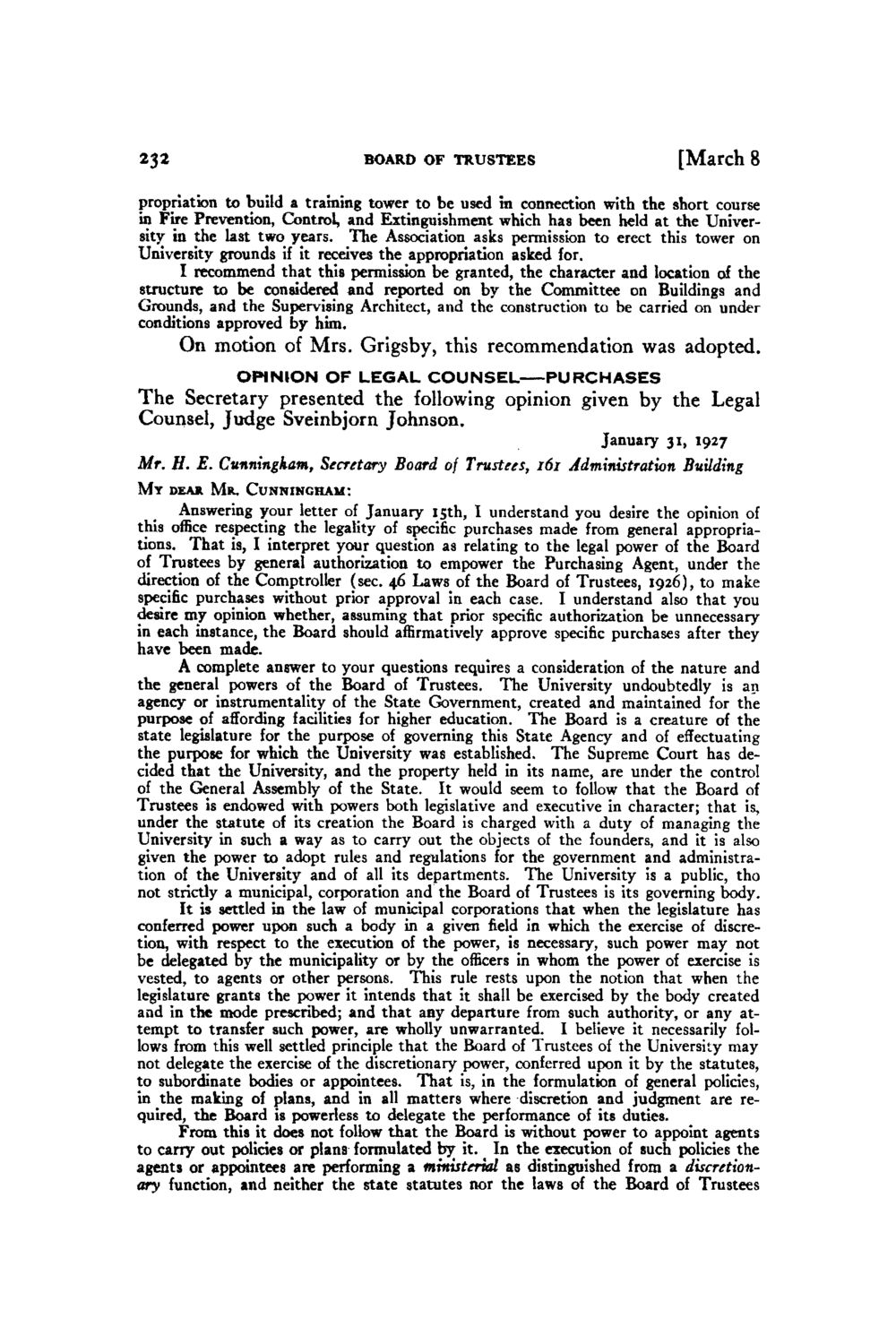| |
| |
Caption: Board of Trustees Minutes - 1928
This is a reduced-resolution page image for fast online browsing.

EXTRACTED TEXT FROM PAGE:
232 BOARD O F TRUSTEES [March 8 propriatbn to build a training tower to be used in connection with the short course in Fire Prevention, Control, and Extinguishment which has been held at the University in the last two years. The Association asks permission to erect this tower on University grounds i it receives the appropriation asked for. f I recommend that this permission be granted, the character and location of the structure to be considered and reported on by the Committee on Buildings and Grounds, and the Supervising Architect, and the construction to be carried on under conditions approved by him. O n motion of M r s . Grigsby, this recommendation w a s adopted. OPINION OF LEGAL COUNSEL PURCHASES The Secretary presented the following opinion given by the Legal Counsel, Judge Sveinbjorn Johnson. January 31, 1927 Mr. H. E. Cunningham, Secretary Board of Trustees, 161 Administration Building M y dear M r . Cunningham: Answering your letter of January 15th, I understand you desire the opinion of this office respecting the legality of specific purchases made from general appropriations. That is, I interpret your question as relating to the legal power of the Board of Trustees by general authorization to empower the Purchasing Agent, under the direction of the Comptroller (sec. 46 Laws of the Board of Trustees, 1926), to make specific purchases without prior approval in each case. I understand also that you desire m y opinion whether, assuming that prior specific authorization be unnecessary in each instance, the Board should affirmatively approve specific purchases after they have been made. A complete answer to your questions requires a consideration of the nature and the general powers of the Board of Trustees. The University undoubtedly is an agency or instrumentality of the State Government, created and maintained for the purpose of affording facilities for higher education. The Board is a creature of the state legislature for the purpose of governing this State Agency and of effectuating the purpose for which the University was established. The Supreme Court has decided that the University, and the property held in its name, are under the control of the General Assembly of the State. It would seem to follow that the Board of Trustees is endowed with powers both legislative and executive in character; that is, under the statute of its creation the Board is charged with a duty of managing the University in such a way as to carry out the objects of the founders, and it is also given the power to adopt rules and regulations for the government and administration of the University and of all its departments. The University is a public, tho not strictly a municipal, corporation and the Board of Trustees is its governing body. It is settled in the law of municipal corporations that when the legislature has conferred power upon such a body in a given field in which the exercise of discretion, with respect to the execution of the power, is necessary, such power may not be delegated by the municipality or by the officers in whom the power of exercise is vested, to agents or other persons. This rule rests upon the notion that when the legislature grants the power it intends that it shall be exercised by the body created and in the mode prescribed; and that any departure from such authority, or any attempt to transfer such power, are wholly unwarranted. I believe it necessarily follows from this well settled principle that the Board of Trustees of the University may not delegate the exercise of the discretionary power, conferred upon it by the statutes, to subordinate bodies or appointees. That is, in the formulation of general policies, in the making of plans, and in all matters where discretion and judgment are required, the Board is powerless to delegate the performance of its duties. From this it does not follow that the Board is without power to appoint agents to carry out policies or plans formulated by it. In the execution of such policies the agents or appointees are performing a ministerial as distinguished from a discretionary function, and neither the state statutes nor the laws of the Board of Trustees
| |